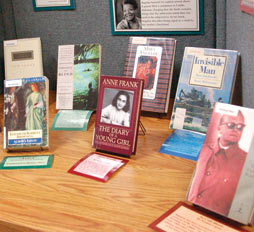
The U.S. Holocaust Memorial Museum currently has a traveling exhibit titled Fighting the Fires of Hate: Americans and the Nazi Book Burnings. Though the exhibit isn’t slated for a Texas destination, the museum’s Web site, www.ushmm.org, hosts an online version of the exhibit.
The exhibit features book burning as a symbol tied to Nazism and the impact that symbol caused.
Among the books publicly burned in Nazi Germany, All Quiet on the Western Front became one of the most targeted.
Written by German Erich Maria Remarque, the novel presents World War I through the eyes of a young German soldier.
The book evokes pacifism and anti-militarism.
The same book was banned in Boston in 1929 for obscenity.
“ It followed then that when Hitler burned a book,” Ray Bradbury once wrote, “I felt it as keenly, please forgive me, as his killing a human, for in the long sum of history, they are one and the same flesh. Mind or body, put to the oven, it is a sinful practice, and I carried that with me.”
Bradbury wrote Fahrenheit 451, a frequently challenged book, which depicts a dystopian future where books are burned and seen as illegal objects.
“ We must all be alike. Not everyone born free and equal, as the constitution says, but everyone made equal,” Captain Beatty says in the book. “A book is a loaded gun in the house next door. Burn it. Take the shot from the weapon. Breach man’s mind.”

Though the novel is more a commentary on the impact of TV on society, it is still a go-to reference for anti-censorship.
“ We all know that books burn,” Franklin D. Roosevelt once said.
“ Yet we have the greater knowledge that books cannot be killed by fire. People die, but books never die.”
